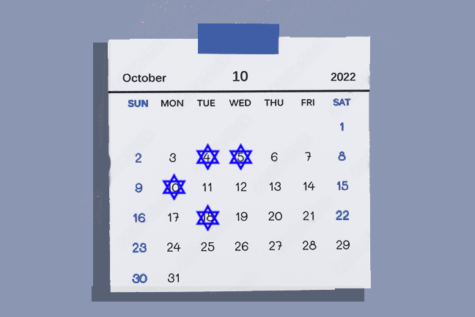OPINION | Tulane should cancel class on Jewish holidays

As we enter the fall season here in New Orleans, many of Tulane University’s Jewish students are preparing to celebrate some of the most important holidays of the year — Rosh Hashanah, Yom Kippur, Sukkot and Simchat Torah. These holidays call for long days in synagogue and various traditions — such as day-long fasting — in order to properly observe them.
With Tulane’s large Jewish student population, it would make sense if the entire student body were given these days off for observation. In reality, classes are still in session, and many students feel as though they will not be supported if they miss their classes.
Although Tulane does not have a religious affiliation, it is well-known that a large portion of the student body is Jewish. More specifically, around 40 percent of Tulane students identify as Jewish. Although these fall holidays are not as well known as Hanukkah and do not have a similar Christian holiday at the same time, they are instrumental to the Jewish religion. Despite this, students are expected to be in class and are responsible for any work assigned on those days.
According to Tulane’s Religious Observance Policy, “every reasonable effort should be made to allow members of the university community to observe their religious holidays without jeopardizing the fulfillment of their academic obligations. It is never acceptable for an instructor to compel a student to choose between religious observance and academic work.”
However, this does not always work out.
At the beginning of each semester, professors stress the importance of attending class. Many classes factor attendance into final grades, and many departments have a strict number of maximum absences. This scares students who want to make sure to preserve their absences for when they truly cannot make it to class. Also, many professors do make a point of mentioning the Religious Observance Policy but only after ensuring that students know how detrimental any absence may be.
Another important part of the Religious Observance Policy says, “it is the obligation of the student to provide faculty within the first two weeks of each semester their intent to observe the holiday so that alternative arrangements convenient to both students and faculty can be made at the earliest opportunity.” Many students aren’t aware that they have to tell their professors their plans so far in advance. Some professors refuse to excuse students from their classes without this advanced notice which prevents students from being able to observe the holiday.
Although freshman Ava Zasloff “[attended] services at Hillel for both Rosh Hashanah and Yom Kippur,” she did not miss any of her classes. However, she does think that “if classes were canceled, [she] would have gone to more services as well as early morning services.”
Jewish students should be able to freely observe their religious holidays without feeling like their attendance and schooling will be affected. In the future, classes should be canceled out of respect to Jewish students who observe or are considering observing any of these holidays.
Your donation will support the student journalists of Tulane University. Your contribution will allow us to purchase equipment and cover our annual website hosting costs.


